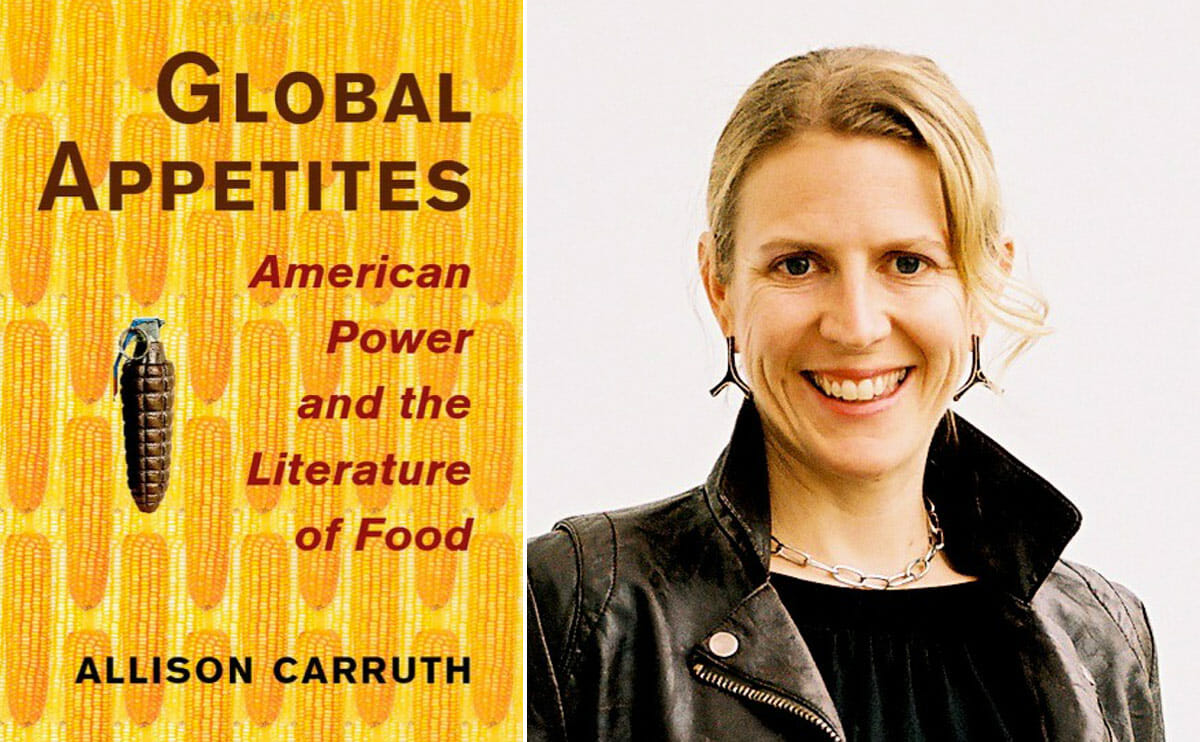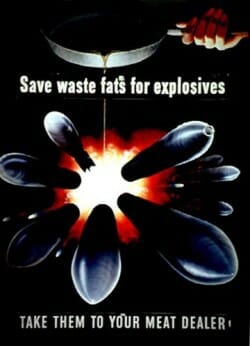Eat Your Words: How Literature Shapes Food
Researchers have found that a few seemingly innocent letters or strings of sentences have incredible potential to shape our views. But can they mold global economic systems? The an...
Eat Your Words: How Literature Shapes Food
Researchers have found that a few seemingly innocent letters or strings of sentences have incredible potential to shape our views. But can they mold global economic systems? The an...

Researchers have found that a few seemingly innocent letters or strings of sentences have incredible potential to shape our views. But can they mold global economic systems? The answer it seems is yes.
In her first book, “Global Appetites: American Power and the Literature of Food,” author Allison Carruth examines how literature both shapes and exposes movements in the nation’s food systems and policies since the World War I. Now a professor at the University of California Los Angeles, she conducted her first research in the agriculture- and literature-friendly Bay Area; she immersed herself in the area’s sustainable agriculture movement while earning her English Lit. doctorate from Stanford University.
Carruth’s extensive research brought her from magical realism books all the way to today’s top-selling food memoirs. We spoke with Carruth about her work at the intersection of food and literature.
Modern Farmer: When did you realize food was a field that interested you?
Alison Carruth: That’s something that goes back to my childhood. I started cooking on my own when I was 7 or 8 years old. I was just endlessly fascinated by flavors, colors and textures, by the experience of putting together a menu. I would do these elaborate dinners for my family when I was maybe 10 or 11. I would create menus. I had these cookbooks written for children. I even had my own napkin-folding book!
When I moved to the Bay Area, it was such a Wonderland to me. There was enormous talent in terms of chefs, bakers, artisanal food makers, but also so much going on around the politics of food and the history of that going back to the 60s or 70s. San Francisco was where food started to take on intellectual and political importance in my life; before it was mostly a hobby.
MF: In your book, you deal with literature, but that doesn’t just mean fiction, right?
AC: I define literature very broadly to include not just established genres like the novel, lyric poetry and drama, but also cookbooks, food memoirs, restaurant reviews, even advertising. These all tell very provocative stories about our food system – whether they’re commissioned by Monsanto or by Slow Food International.
MF: What is your central argument in “Global Appetites”?
AC: My argument is that we cannot understand a concept like globalization or history of the U.S. rise to becoming superpower without looking closely at changes in how we grow and consume food.
When we talk about globalization, we neglect just how important food and agriculture is. The tendency is to focus on more abstract mechanisms for global power like finance, trade agreements or international borders. No doubt they are crucial, but it was interesting to me that food and agriculture’s role was a minor point in both academic and mainstream discussions.

MF: Can you give us an example of that happening?
AC: Well, after World War I, President Calvin Coolidge gave an incredible speech to a group of farmers and foreign policy people calling agriculture as a “great industrial enterprise.” That was unprecedented. Before then, farming was seen as a retreat from industry.
MF: Do you have some favorite “Aha! moments” while writing this book?
AC: My first Aha moment was seeing this poster of a woman’s manicured hand, holding a skillet with bacon grease dripping down into a cluster of exploding warheads. It became my argument in miniature in visual form.
I went back to the writers of the time and realized that wherever there was a connection between starvation and prosperity, there was also reference to war. Chemical weapons are the same compounds as pesticides. Pesticides become a way of creating economic markets out of war chemicals during peacetime. Barbed wire serves both large-scale ranching and trench warfare.
The list goes on and on. It was a huge moment for me to think about the darker side of agriculture. Although it is productive at least in staple crops, it creates this profound social inequality that many writers saw as a violence equivalent to war.
MF: What do you hope people will take away after reading your book?
AC: For people interested in agriculture movements, I hope they gain a historical depth from reading the book. “Global Appetites” provides a back-story for the politics they’re involved with now.
I also hope it provokes people to interrogate both the strengths and the blind spots of their own politics – to ask questions. What kinds of local connection do we want to encourage between farmers and consumers? What are some of the globalized connections that are valuable, even if we’re deeply committed to environmental sustainability and social justice? What trade-offs and conflicts emerge when we talk about food justice? How can we address these things?
(This interview has been edited and condensed.)
Follow us

This work is licensed under a Creative Commons Attribution-NoDerivatives 4.0 International License.
Want to republish a Modern Farmer story?
We are happy for Modern Farmer stories to be shared, and encourage you to republish our articles for your audience. When doing so, we ask that you follow these guidelines:
Please credit us and our writers
For the author byline, please use “Author Name, Modern Farmer.” At the top of our stories, if on the web, please include this text and link: “This story was originally published by Modern Farmer.”
Please make sure to include a link back to either our home page or the article URL.
At the bottom of the story, please include the following text:
“Modern Farmer is a nonprofit initiative dedicated to raising awareness and catalyzing action at the intersection of food, agriculture, and society. Read more at <link>Modern Farmer</link>.”
Use our widget
We’d like to be able to track our stories, so we ask that if you republish our content, you do so using our widget (located on the left hand side of the article). The HTML code has a built-in tracker that tells us the data and domain where the story was published, as well as view counts.
Check the image requirements
It’s your responsibility to confirm you're licensed to republish images in our articles. Some images, such as those from commercial providers, don't allow their images to be republished without permission or payment. Copyright terms are generally listed in the image caption and attribution. You are welcome to omit our images or substitute with your own. Charts and interactive graphics follow the same rules.
Don’t change too much. Or, ask us first.
Articles must be republished in their entirety. It’s okay to change references to time (“today” to “yesterday”) or location (“Iowa City, IA” to “here”). But please keep everything else the same.
If you feel strongly that a more material edit needs to be made, get in touch with us at [email protected]. We’re happy to discuss it with the original author, but we must have prior approval for changes before publication.
Special cases
Extracts. You may run the first few lines or paragraphs of the article and then say: “Read the full article at Modern Farmer” with a link back to the original article.
Quotes. You may quote authors provided you include a link back to the article URL.
Translations. These require writer approval. To inquire about translation of a Modern Farmer article, contact us at [email protected]
Signed consent / copyright release forms. These are not required, provided you are following these guidelines.
Print. Articles can be republished in print under these same rules, with the exception that you do not need to include the links.
Tag us
When sharing the story on social media, please tag us using the following: - Twitter (@ModFarm) - Facebook (@ModernFarmerMedia) - Instagram (@modfarm)
Use our content respectfully
Modern Farmer is a nonprofit and as such we share our content for free and in good faith in order to reach new audiences. Respectfully,
No selling ads against our stories. It’s okay to put our stories on pages with ads.
Don’t republish our material wholesale, or automatically; you need to select stories to be republished individually.
You have no rights to sell, license, syndicate, or otherwise represent yourself as the authorized owner of our material to any third parties. This means that you cannot actively publish or submit our work for syndication to third party platforms or apps like Apple News or Google News. We understand that publishers cannot fully control when certain third parties automatically summarize or crawl content from publishers’ own sites.
Keep in touch
We want to hear from you if you love Modern Farmer content, have a collaboration idea, or anything else to share. As a nonprofit outlet, we work in service of our community and are always open to comments, feedback, and ideas. Contact us at [email protected].by Carren Jao, Modern Farmer
August 5, 2013
Modern Farmer Weekly
Solutions Hub
Innovations, ideas and inspiration. Actionable solutions for a resilient food system.
ExploreExplore other topics
Share With Us
We want to hear from Modern Farmer readers who have thoughtful commentary, actionable solutions, or helpful ideas to share.
SubmitNecessary cookies are absolutely essential for the website to function properly. This category only includes cookies that ensures basic functionalities and security features of the website. These cookies do not store any personal information.
Any cookies that may not be particularly necessary for the website to function and are used specifically to collect user personal data via analytics, ads, other embedded contents are termed as non-necessary cookies.